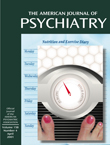Urinary Free Cortisol in Chronic Fatigue Syndrome
Abstract
OBJECTIVE: The authors measured 24-hour urinary free cortisol in a group of well-characterized patients with chronic fatigue syndrome. METHOD: They obtained 24-hour urine collections from 121 consecutive clinic patients with chronic fatigue syndrome and 64 comparison subjects without the syndrome. RESULTS: Urinary free cortisol was significantly lower in the subjects with chronic fatigue syndrome regardless of the presence or absence of current or past comorbid psychiatric illness. Lower levels of urinary free cortisol were not related to medication use, sleep disturbance, or disability levels. CONCLUSIONS: There is mild hypocortisolism in chronic fatigue syndrome. Whether a primary feature or secondary to other factors, hypocortisolism may be one factor contributing to the symptoms of chronic fatigue syndrome.



